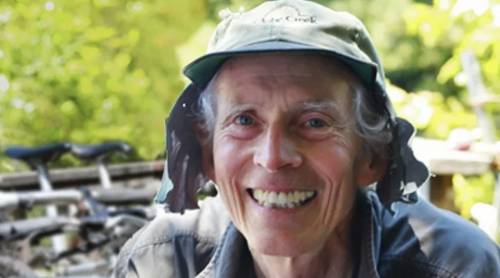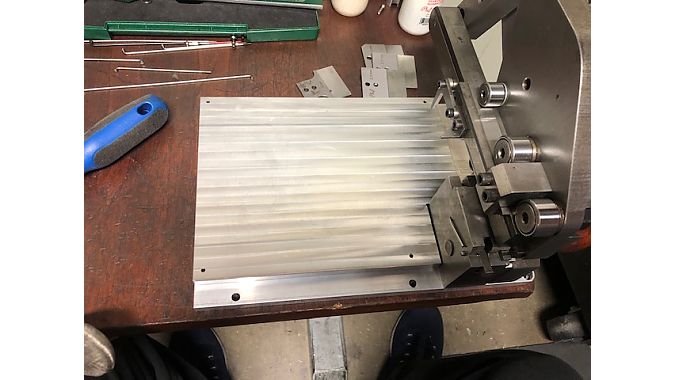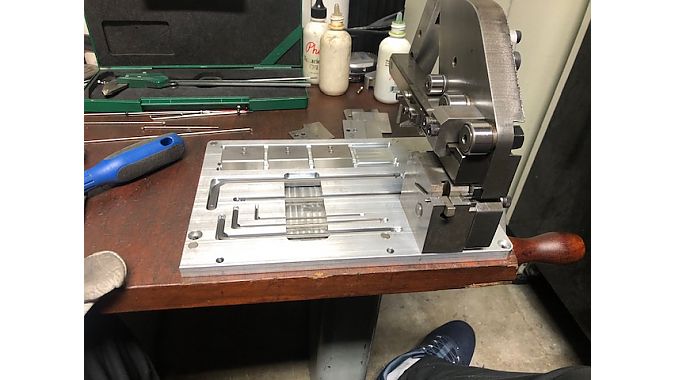MARIN, Calif. (BRAIN) — Mountain Bike Hall of Famers Charlie Cunningham and Jacquie Phelan are selling Cunningham’s customized and refurbished Phil Wood & Co. spoke threading machine to support his ongoing care following a bike accident almost nine years ago.
Cunningham is the owner of Cunningham Bikes and was a co-founder of WTB. He was a pioneer in producing welded aluminum mountain bike frames, and developed zero-dish rear wheels, extra-wide front hubs, roller cam brakes, Grease Guard bearings, sloping top tubes and more. He developed the RM20 rim for Araya, one of the first lightweight mountain bike rims. He also designed the original Ground Control tread for Specialized (Phelan came up with the model name).
After a day spent welding a fork for a new road bike for Phelan, Cunningham left for a ride on Aug. 3, 2015, on Bolinas Fairfax Road, one of the most famous and scenic routes in the Marin area.
Phelan, Cunningham’s wife, said he “either hit a deer or was hit by a car,” and “crawled back up to the road and hitchhiked with the bike back home. He broke several ribs, his clavicle and lower pelvic bone, all of which healed,” she said in an email to BRAIN.
However, an undiagnosed brain injury manifested seven weeks later and he almost died.
“The next seven years were intense for him, as an independent ‘fixer’ whose motto was ‘Shittyness will not be tolerated,’” Phelan wrote. He lost the ability to read, and the spatial awareness that gave him an internal map of the entire county of Marin, and of the four-room cabin they live in, she said.
Before the pandemic lockdown, Cunningham and Phelan received some in-home professional help for a few hours every week, but during the pandemic, Phelan had to provide care 24-7. As Cunningham's condition declined he moved into a care facility. The couple sold most of his bike collection and tools to cover expenses.
The facility costs about $8,000 a month Phelan said.
“The fact that complex, chronic conditions are not part of the American health care system means that we are on our own to find physical, occupational therapists, and home care — for life,” she said.
“I’m not sure how to fix that; it seems as though some sort of very large adjustment will have to be made, but probably not soon enough for most of us alive today,” she said.
Cunningham bought one of the first 100 spoke machines that Phil Wood made in the early 1970s, said Peter Enright, the owner and president of the company. While the early-generation machine lacked some of the updates that the company added over the years, Cunningham made his customizations. This year, the company refurbished the machine and added some additional “enhancements,” said Enright, making it truly a one-of-a-kind tool.
The enhancements include a lidded storage area at the machine's base that includes all the tools and spacers needed to adjust the machine for different spoke gauges.
“What we did was we started replacing various parts, now we have the newest version of everything on the machine, with all enhancements, and there is some intrinsic value in the fact that Charlie owned it and made some changes to it,” he said.
New machines sell for about $7,000. Phelan said she was hoping to sell Cunningham’s machine for at least that, which would equate roughly to the cost of a month in the care facility where Cunningham now lives. She is accepted bids and inquiries at jacquie@batnet.com.
There is also an ongoing crowd-funding campaign set up on Cunningham’s behalf at gofundme.com/f/charlie-cunningham-medical-and-rehab.








